Donald Trump has sent some mixed signals on China. One minute they are “raping” America, the next they are his best clients. Even the way he says the word – and he says it a lot – seeds confusion. Sometimes the president-elect spits it out like poison, sometimes he exclaims the word as if greeting a favoured child. Whatever his real attitude, those that study the world’s second-largest economy believe US-China relations are in for a rocky time when Trump reaches the White House – and the global consequences could be dire.
Trump excoriated China’s trade policies during his election campaign and succeeded in needling Beijing into threats of retaliation after pledging to whack a 45% tariff on Chinese imports.
The president-elect rattled Beijing again earlier this month after taking a call from Taiwanese president Tsai Ing-wen – the first communication between top officials from the two governments in nearly 40 years.
Last week he seemed to be attempting to mend fences, appointing Iowa governor Terry Branstad, “an old friend of the Chinese people” according to Beijing officials, as his ambassador to China. But such a signal has not been enough to head off worries of a looming trade war between China and the US that would send shockwaves across the globe.
“The initial signs are not good,” said Minxin Pei, professor of government at Claremont McKenna College in California and author of the book China’s Crony Capitalism.
The US has recognised Taiwan as part of China since 1979 and its status is “non-negotiable”, said Pei. Branstad is an interesting pick and “shows a gesture that he wants to keep the relationship on an even keel”. But Pei said descriptions of Branstad as a longtime friend of Chinese leader Xi Jinpin were overblown. “That’s a very American way of describing friendship. Very few Chinese leaders have longtime friends,” he said. “What China really values in an ambassador is not his relationship with them but his relationship with the White House.”
Those doing business with the two trading powers will have a lot invested in the pro-trade Branstad’s powers of persuasion. Academic studies have already shown the consequences of political spats with Beijing. In 2010 the University of Gottingen in Germany coined the term “the Dalai Lama effect” after its study found countries whose top leadership met with Tibet’s exiled spiritual leader lost on average 8.1% in exports to China in the two years following the meeting.
The first true test of the Trump White House’s relationship with China may come in April, when the US Treasury releases a report looking at China’s currency. Trump has long maintained that China has been devaluing its currency in order to stack the deck on exports in its favour.
“If he wants to impose tariffs on China, he needs a procedural excuse. He can’t just get into the White House and the next day announce a tariff increase, it wouldn’t look good,” said Pei.
Allegations of Chinese currency manipulation are out of date and largely incorrect, according to Pei. In fact, Beijing has been burning through its currency reserves in an attempt to prop up the value of the yuan. “But for Donald Trump that doesn’t matter. Intellectual rigour is not one of his concerns.”
Louis Kuijs, head of Asia economics at Oxford Economics and a former senior China economist at the World Bank, said it was “more legitimate now than at anytime in the last 10 years to talk about the risk of something pretty close to a trade war”, he said.
“Anyone with a stake in Chinese exports, especially to the US, should be worried,” said Kuijs, adding that US and European companies that assemble products in China would also see their bottom lines affected.
If a trade war starts, it is likely to start with targeted hits, said Pei. If Trump wants to placate his base in the midwest he could target Chinese steel, for example. China is engaging “in at least questionable” practices in the steel industry, says Pei. “The industry has so much overcapacity and they are exporting a lot of cheap steel and that is disrupting.”
If the moves are small enough, China might chose to ignore them and concentrate on the bigger picture. But past at a certain point, Beijing will retaliate and would likely target large American firms, Boeing or Apple for example, that increasingly rely on China.
Both sides have a lot to lose in a trade war. China is currently the US’s largest goods trading partner. Trade between the two was worth $598bn in total during 2015, with US exports to China totalling $116bn and imports totalling $482bn. China has more to lose but the types of goods it sells to the US are harder to source elsewhere.
The three largest categories of goods China buys from the US are soybeans, cars and aircraft, all of which China could source from elsewhere.
The three largest categories that the US imports from China are mobile phones, tablets/laptops and network equipment. “In each case, China is the dominant global supplier, producing about 70% of global output. A high tariff would end up as effectively a tax on US purchases of consumer electronics,” Capital Economics’ chief Asia economist wrote in a recent note to investors.
Tariffs on those goods would also disrupt trade right across the Asia Pacific region, said Pei. Some 35% of China’s exports in 2015 was “processing trade”, where China imports components from other countries and assembles them for exports. A trade war with China on those goods would cause collateral damage on imports from Japan, South Korea, Taiwan and others.
While both sides would suffer, China’s economy is more reliant on US exports and a serious spat would rock the economy at a time of sluggish growth. Household debt has soared as property prices have increased, and millions of workers are set to lose their jobs as the government seeks to rebalance the economy away from state-led investments.
Not all factory owners in China are worried about an upcoming trade war. “Trump’s grandstanding performances during the campaign were for publicity, but he’s a successful businessman and therefore should be very rational in his thinking,” said Sun Sijun, chief executive of Uptop Group in southern China, which exports between $150m-$200m worth of Samsonite suitcases and Walmart shoes to the US every year. “Rationally, the basic interests are not to make enemies, and to ultimately not harm yourself,” he said.
“Trump’s talk of increasing tariffs is in the hope of increasing employment in America,” Sun said. “But there’s a very small probability you can bring these labour-intensive industries back to the US. Labour-intensive industries flowed to third world, and they won’t return to America.”
But other producers in China see only dark clouds on the horizon. Chen Yadong also sells to Walmart. His company, Indena, makes computer mice and bluetooth speakers, sending more than 1m mice to the US each year.
“I’m extremely worried,” Chen said from the electronics manufacturing hub of Shenzhen in southern China. “The US is the largest market for export-oriented companies here. If Trump increases tariffs, then this business will become increasingly difficult.”
China’s leaders don’t know what to think of Trump quite yet, said Pei. But they do understand the consequences of a trade war. “The Chinese have a proverb: ‘you lift a rock only to drop it on your own foot.’”
Additional reporting by Christy Yao
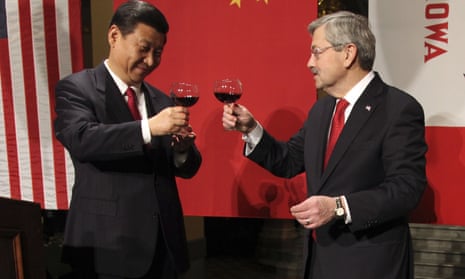

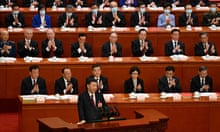

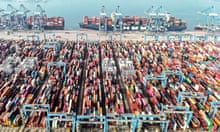

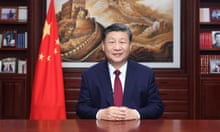

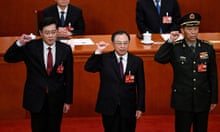

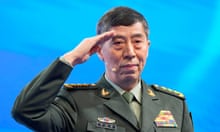
Comments (…)
Sign in or create your Guardian account to join the discussion